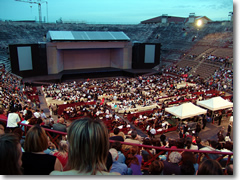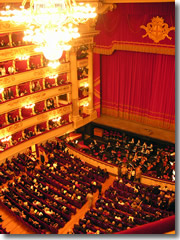All of Italy's a stage
Opera, theater, and concerts in Italy

The ancient Arena amphitheater in Verona is the setting for many a summertime opera performance.Whether seated under the stars in Sicily or surrounded by the sumptuous trappings of La Scala in Milan, taking in an opera or other muscial performance is one of the top experiences of any Italian vacation.
Whether it's rock concerts or church concerts (most modestly priced; many free of charge), piano recitals in the cathedral cloisters or chamber orchestras in a Renaissance palazzo, there's always something musical going on in Italy.
Top musical venues in Italy

The interior of Milan's La Scala.Opera and music are a part of life in Italy, and every Italian town worth its salt has a local theater or performance space, even if it's just the local church.
From the grand old opera houses of Milan, Naples, and Venice to ancient Roman amphitheaters and bath complexes (not to mention ancient Greek theaters) converted to serve as performances al fresco under the summer stars, here are some of the best venues for live music and performances across Italy.
- La Scala, Milan - Arguably the greatest (and certainly the most famous) opera house in the world.
- Teatro di San Carlo, Naples - The 18th century opera house that gave us the world's first primadonnas.
- The Arena, Verona - Roman amphitheater from AD 30, now putting on Aïda and pop operas instead of gladiator battles.
- Baths of Caracalla, Rome - The ancient Roman baths frequently serve as an opera stage in the summertime.
- La Fenice, Venice - "The Phoenix" of Venice has—appropriately enough—been reborn from the ashes (twice) after devastating fires.
- Scuola Grande di San Rocco, Venice - A personal favorite, in a medeival fraternity house surrounded by dozens of Tintoretto paintings.
- Maggio Musicale, Florence - Not one venue, but many across Florence host this May music fesitval with performances from the grand theaters in town to the Roman ruins in Fiesole.
- Villa Rufolo gardens, Ravello - Amazing concerts in the very gardens that inspired Wagner's Parsifal on a stage hovering over a drop-dead vista of the Amalfi Coast below.
- The Greek theater, Siracusa - Entertaining Siclians for 2,500 years, the open-air theater built by the Tyrants of ancient Syracuse continues to host spectacular performances and concerts under the stars.
- Teatro dell'Opera, Rome - You simply havent seen Aïda until you've seen the cavalcade of animals (including horses galloping across the stage) of the classic Rome opera house performance.
Italy's amazing musical heritage
Italy invented opera.
It's true: The first stage play set to music with the lines entirely sung was Dafne by Jacopo Peri and Ottavio Rinuccini, performed in 1589 in Florence's Boboli Gardens on the occasion of a princely wedding between Ferdinando de’ Medici and Christine of Lorraine.
fact
Everyone who's ever plinked their way through Twinkle Twinkle Little Star or clumsily plucked out the opening riff to Stairway to Heaven using sheet music has Italy to thank for that, too. (No, not the Zepplin tune; the sheet music for it.)
In addition to inventing opera, Italy also devised the modern musical notation system we still use today to copy down tunes so everyone can play on the same page.
The musical scale was the brainchild of a monk from Arezzo named Guido, born way back in 995.
Rock on, Guido. Rock on.
Sadly, that work is lost. (Peri and Rinuccini's sophomore effort—
Erudice, premiered in 1600—is the world's oldest
surviving opera score.)
Over the ensuing centuries, Italy produced such musical Titans as Giacomo Puccini, Gioacchino Rossini (whose William Tell Overture will forever be hummed by Lone Ranger aficionados), Boccherini, Antonio Vivaldi, and Giuseppe Verdi.
Italy also gave us the first primadonna (this less than flattering nickname was originally assigned to the "first lady"—in Italian, prima donna—of the company at Naples's famous Teatro di San Carlo, the one who would get all the choice roles and killer arias.)
And let's not forget the world's most exquisite violins, violas, and cellos crafted by the artisans of Cremona whose names are still household words after more than 300 years: Stradivarius, Ruggeri, and Guarneri.
Oh, and Italians invented the piano, too. ("Piano" is actually short for the Italian name pianoforte, which means "softloud," describing how this revolutionary instrument could be played in anything from an airy whisper to a teeth-chattering boom.)
In other words, all those great things you've heard about Italian art, food, and wine? That goes for Italian music, too.
Tips & links
Details
Useful links & resources
- Car resources
- Emergency service/tow: tel. 803-116
- Highway agency: Autostrade.it (traffic info, serivce areas, toll calculator, weather)
- Italian automotive club (~AAA): Aci.it
- ZTLs: Ztl-italia.blogspot.com (lightly outdated, but handy, links to cities' traffic-free zones)
Share this page

Search ReidsItaly.com

